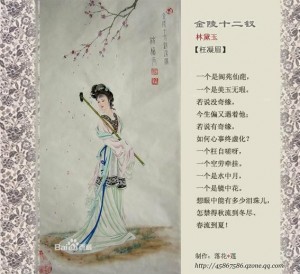Eighteen Refrains on Tartar Pipes 10, 11, 12 Cai Yan [Cai Wenji] (ca. 177-?)
Tr. YK Chan 陈耀国译
10
城头烽火不曾灭,疆场征战何时歇?
Beacons on the Great Wall are ne’er out at ease,
Will fights on the battlefield ever cease?
杀气朝朝冲塞门,胡风夜夜吹边月。
Day after day killing rampages through the frontier gates,
Night after night gusts whip along moonlit border in haste.
故乡隔兮音尘绝,哭无声兮气将咽。
Isolated from homeland news can’t be heard,
Muted sobs of frustration are swallowed and unheard.
一生辛苦兮缘离别,十拍悲深兮泪成血。
A hard life since my separation from those I love,
At sad tenth refrain my tears turn fast into blood.
11
我非贪生而恶死,不能捐身兮心有以。
I loathe dying not because I wish to long live,
For good reasons I don’t take my own life.
生仍冀得兮归桑梓,死当埋骨兮长已矣。
Living, so one day to my homeland I’ll return,
If dead, and my bones buried that’s just not a concern.
日居月诸兮在戎垒,胡人宠我兮有二子。
Day in day out staying in war camp what I’ve done;
Tartar spoils me as I bore him two sons.
鞠之育之兮不羞耻,悯之念之兮生长边鄙。
Them I nurture without dishonour,
‘Tis a pity they’re brought up off the border.
十有一拍兮因兹起,哀响缠绵兮彻心髓。
So it starts for the eleventh refrain,
My grief lingers deep inside unrestrained.
12
东风应律兮暖气多,知是汉家天子兮布阳和。
Vernal breezes harmonize in a warming trend,
By virtue of the Han emperor’s grace it tends.
羌胡蹈舞兮共讴歌,两国交欢兮罢兵戈。
Southern Huns celebrate by song and dance,
For the two nations reconcile and lay down their arms.
忽遇汉使兮称近诏,遣千金兮赎妾身。
Han emissary suddenly brings forth the emperor’s mission,
That’s to send handsome monies for my repatriation.
喜得生还兮逢圣君,嗟别稚子兮会无因。
Joyful of survival and meeting the virtuous son of heaven,
But regrets to leaving young sons without good reason.
十有二拍兮哀乐均,去往两情兮难具陈。
At twelfth refrain grief and joy made even,
My mixed emotions are difficult for entailment.






